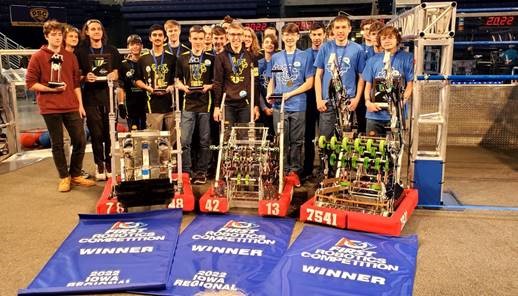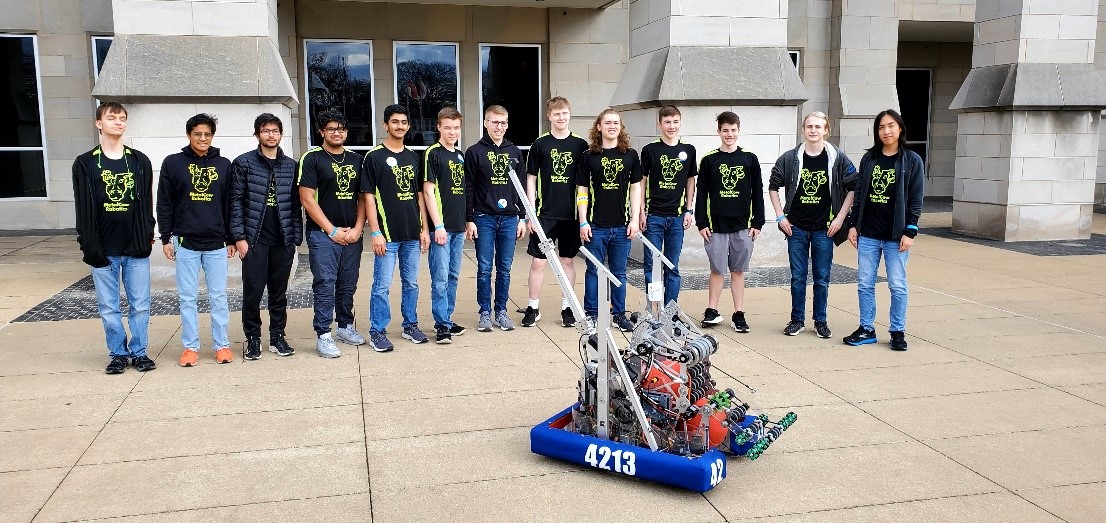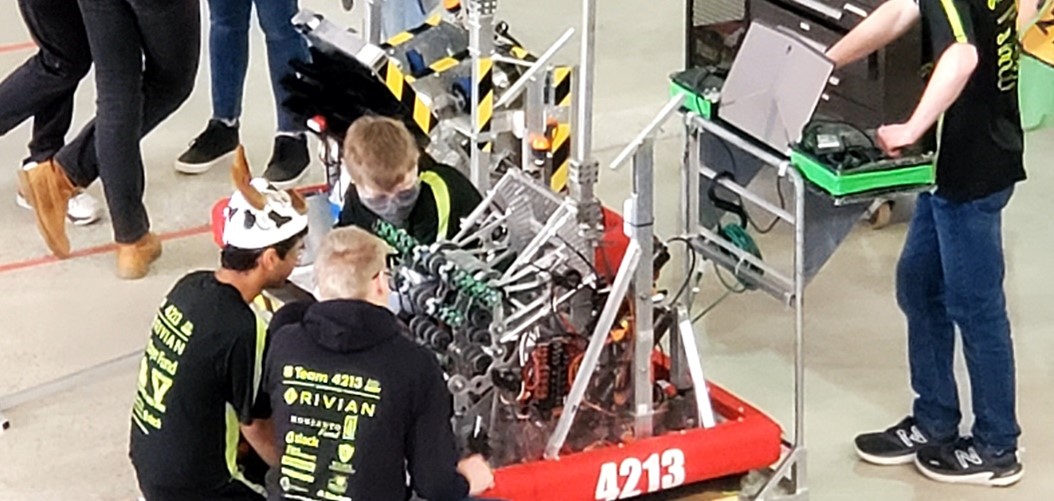BLOOMINGTON, Ill. – Robotics teaches more than just competition and University of Illinois Extension-McLean County 4-H youth are using their minds, ideas, and skills to take them beyond.
MetalCow Robotics is a local 4-H Robotics team which meets at Second Presbyterian Church in Bloomington. This past weekend they earned first place at the FIRST® Robotics Iowa Regional where they outranked 44 other teams from across the Midwest. Their robot, named Klondike, was also awarded the Iowa Regional Industrial Design Award sponsored by General Motors® for best demonstrating industrial design principles, striking a balance between form, function, and aesthetics.
MetalCow’s victory at the regional competition qualifies them to compete in the international FIRST® Championship in Houston, TX from April 20 to April 23, 2022. There they will compete against the best teams from across the globe, with teams from Australia to Brazil, Canada to China, and Netherlands to Turkey. All teams travel there to enhance their technical skills, collaborate with teams from across the globe, and hopefully secure an international title.
The local team is comprised of 18 high school students who volunteer in a variety of ways. Students highly involved spend between 10 and 15 hours a week building the robot while others with less time available, fill in between school and activities. Because the season lasts from January to March-April each year, the team must work quickly. Most specialize on a particular technical skill they want to develop. The team currently breaks out into five focus areas: the design team, which creates CAD drawings to visualize and test designs before the build, the electrical team, which focuses on wiring and controllers, the code team, which builds software in the JAVA coding language to run the robot, the build team, which fabricates the robot, and the analytics team, which gathers data on the competing teams to develop their game strategy.
While you might think you need to be technical and have a love of STEM (Science, Technology, Engineering, Math) to join a robotics team, they also need students and adult volunteers with skills in social media, fundraising, project management, outreach, and business planning as well. A robotics season can easily cost $20,000 a year and requires students to learn how to approach businesses asking for donations and buildout strategic partnerships with local companies including: Rivian, Wilber, State Farm, Country Financial, and G3.
While MetalCow is the oldest and most senior team, Second Presbyterian Church in conjunction with 4-H and FIRST® robotics hosts several teams for all ages from 6 to 18. PowerSurge 4-H Robotics FIRST® LEGO® League Challenge teams won awards at both regional and state levels. The summers are the best time to explore robotics since that is when MetalCow and the other younger teams run introductory workshops for those of every age group interested in learning more. For more on joining a robotics club and 4-H in McLean County, visit go.illinois.edu/McLean4H or contact 4-H staff at the McLean County Extension Office in Bloomington by stopping in or calling 309-663-8306.
SOURCE: MetalCow Robotics 4-H - Eric Vinsel, Club Volunteer
ABOUT EXTENSION: Illinois Extension leads public outreach for University of Illinois by translating research into action plans that allow Illinois families, businesses, and community leaders to solve problems, make informed decisions, and adapt to changes and opportunities.
ABOUT ILLINOIS 4-H: Illinois 4-H is the flagship youth development program of University of Illinois Extension and administered through the College of Agriculture, Consumer, and Environmental Sciences. 4-H grows true leaders, youth who are empowered for life today and prepared for a career tomorrow. The hands-on approach in 4-H gives young people guidance, tools, and encouragement, and then puts them in the driver’s seat to make great things happen. Independent research confirms the unparalleled impact of the 4-H experience, demonstrating that young people are four times more likely to contribute to their communities; two times more likely to make healthier choices; two times more likely to be civically active; and two times more likely to participate in STEM programs.


